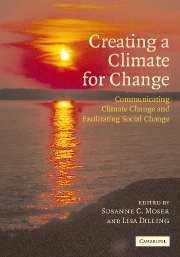Book contents
- Frontmatter
- Contents
- Preface
- Foreword
- List of contributors
- List of tables
- List of figures
- List of text boxes
- Introduction
- Part I Communicating climate change
- Part II Facilitating social change
- 15 Stuck in the slow lane of behavior change? A not-so-superhuman perspective on getting out of our cars
- 16 Consumption behavior and narratives about the good life
- 17 Educating for “intelligent environmental action” in an age of global warming
- 18 Education for global responsibility
- 19 Changing the world one household at a time: Portland's 30-day program to lose 5,000 pounds
- 20 Changing organizational ethics and practices toward climate and environment
- 21 Change in the marketplace: business leadership and communication
- 22 The market as messenger: sending the right signals
- 23 Making it easy: establishing energy efficiency and renewable energy as routine best practice
- 24 Forming networks, enabling leaders, financing action: the Cities for Climate Protection™ campaign
- 25 Ending the piecemeal approach: Santa Monica's comprehensive plan for sustainability
- 26 States leading the way on climate change action: the view from the Northeast
- 27 West Coast Governors' Global Warming Initiative: using regional partnerships to coordinate climate action
- 28 Building social movements
- 29 Climate litigation: shaping public policy and stimulating debate
- 30 The moral and political challenges of climate change
- Part III Creating a climate for change
- About the authors
- Index
- References
16 - Consumption behavior and narratives about the good life
Published online by Cambridge University Press: 20 August 2009
- Frontmatter
- Contents
- Preface
- Foreword
- List of contributors
- List of tables
- List of figures
- List of text boxes
- Introduction
- Part I Communicating climate change
- Part II Facilitating social change
- 15 Stuck in the slow lane of behavior change? A not-so-superhuman perspective on getting out of our cars
- 16 Consumption behavior and narratives about the good life
- 17 Educating for “intelligent environmental action” in an age of global warming
- 18 Education for global responsibility
- 19 Changing the world one household at a time: Portland's 30-day program to lose 5,000 pounds
- 20 Changing organizational ethics and practices toward climate and environment
- 21 Change in the marketplace: business leadership and communication
- 22 The market as messenger: sending the right signals
- 23 Making it easy: establishing energy efficiency and renewable energy as routine best practice
- 24 Forming networks, enabling leaders, financing action: the Cities for Climate Protection™ campaign
- 25 Ending the piecemeal approach: Santa Monica's comprehensive plan for sustainability
- 26 States leading the way on climate change action: the view from the Northeast
- 27 West Coast Governors' Global Warming Initiative: using regional partnerships to coordinate climate action
- 28 Building social movements
- 29 Climate litigation: shaping public policy and stimulating debate
- 30 The moral and political challenges of climate change
- Part III Creating a climate for change
- About the authors
- Index
- References
Summary
Introduction
Numerous studies in Europe and North America have pointed to the importance of consumption patterns in shaping greenhouse gas (GHG) emissions (Michaelis and Lorek, 2004; Brower and Leon, 1999). Around 75–80 percent of economy-wide emissions are associated with three areas of consumption: food, transport, and shelter (including household energy use). The location of emissions in the supply chain is shifting away from industry, which is becoming more efficient, and shifting towards lower-carbon fuels, and towards households and institutions (Price et al., 1998).
Emissions of GHG can be reduced either by changing consumption patterns and lifestyles, or by reducing emissions per unit of consumption – e.g., through improved energy and resource efficiency or switching to renewable sources (see also Dilling and Farhar, Chapter 23, this volume). Environmentalists in the 1970s gained a “hair shirt” image, connecting values of community living, getting back to the land, and simple lifestyles. But after political commentators derided US President Jimmy Carter's appearance on TV wearing a cardigan during the 1979 oil crisis, governments have been careful to focus on supply-side and technological responses to climate change. During the 1990s, environmental groups adopted a similar focus as they were increasingly included in policy advice circles and business partnerships. The mainstreaming of environmental politics has involved the abandonment of its countercultural edge.
The consumption debate in the industrialized world was rekindled in large part by pressure from the developing country delegations at the Rio Earth Summit in 1992.
- Type
- Chapter
- Information
- Creating a Climate for ChangeCommunicating Climate Change and Facilitating Social Change, pp. 251 - 265Publisher: Cambridge University PressPrint publication year: 2007
References
- 4
- Cited by



